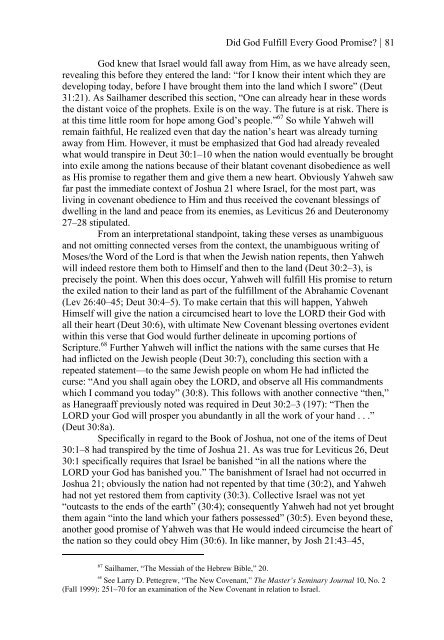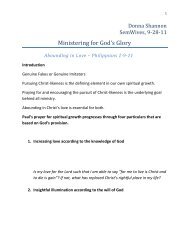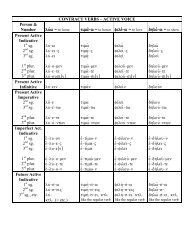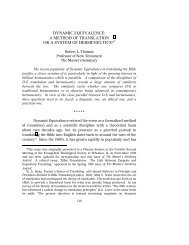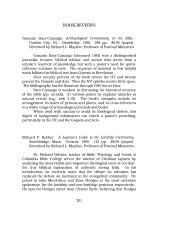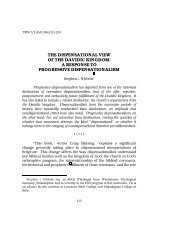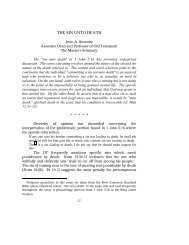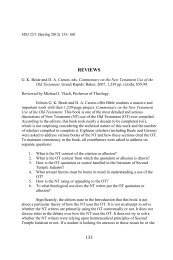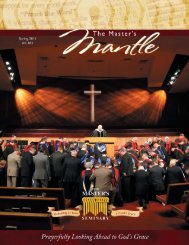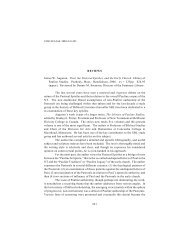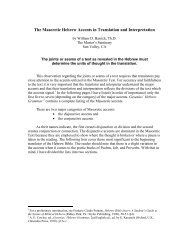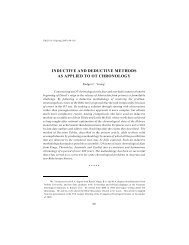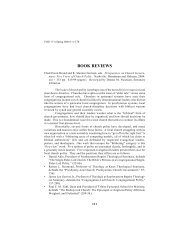Did God Fulfill Every Good Promise? - The Master's Seminary
Did God Fulfill Every Good Promise? - The Master's Seminary
Did God Fulfill Every Good Promise? - The Master's Seminary
You also want an ePaper? Increase the reach of your titles
YUMPU automatically turns print PDFs into web optimized ePapers that Google loves.
<strong>Did</strong> <strong>God</strong> <strong>Fulfill</strong> <strong>Every</strong> <strong>Good</strong> <strong>Promise</strong>? | 81<strong>God</strong> knew that Israel would fall away from Him, as we have already seen,revealing this before they entered the land: “for I know their intent which they aredeveloping today, before I have brought them into the land which I swore” (Deut31:21). As Sailhamer described this section, “One can already hear in these wordsthe distant voice of the prophets. Exile is on the way. <strong>The</strong> future is at risk. <strong>The</strong>re isat this time little room for hope among <strong>God</strong>’s people.” 67 So while Yahweh willremain faithful, He realized even that day the nation’s heart was already turningaway from Him. However, it must be emphasized that <strong>God</strong> had already revealedwhat would transpire in Deut 30:1–10 when the nation would eventually be broughtinto exile among the nations because of their blatant covenant disobedience as wellas His promise to regather them and give them a new heart. Obviously Yahweh sawfar past the immediate context of Joshua 21 where Israel, for the most part, wasliving in covenant obedience to Him and thus received the covenant blessings ofdwelling in the land and peace from its enemies, as Leviticus 26 and Deuteronomy27–28 stipulated.From an interpretational standpoint, taking these verses as unambiguousand not omitting connected verses from the context, the unambiguous writing ofMoses/the Word of the Lord is that when the Jewish nation repents, then Yahwehwill indeed restore them both to Himself and then to the land (Deut 30:2–3), isprecisely the point. When this does occur, Yahweh will fulfill His promise to returnthe exiled nation to their land as part of the fulfillment of the Abrahamic Covenant(Lev 26:40–45; Deut 30:4–5). To make certain that this will happen, YahwehHimself will give the nation a circumcised heart to love the LORD their <strong>God</strong> withall their heart (Deut 30:6), with ultimate New Covenant blessing overtones evidentwithin this verse that <strong>God</strong> would further delineate in upcoming portions ofScripture. 68 Further Yahweh will inflict the nations with the same curses that Hehad inflicted on the Jewish people (Deut 30:7), concluding this section with arepeated statement—to the same Jewish people on whom He had inflicted thecurse: “And you shall again obey the LORD, and observe all His commandmentswhich I command you today” (30:8). This follows with another connective “then,”as Hanegraaff previously noted was required in Deut 30:2–3 (197): “<strong>The</strong>n theLORD your <strong>God</strong> will prosper you abundantly in all the work of your hand . . .”(Deut 30:8a).Specifically in regard to the Book of Joshua, not one of the items of Deut30:1–8 had transpired by the time of Joshua 21. As was true for Leviticus 26, Deut30:1 specifically requires that Israel be banished “in all the nations where theLORD your <strong>God</strong> has banished you.” <strong>The</strong> banishment of Israel had not occurred inJoshua 21; obviously the nation had not repented by that time (30:2), and Yahwehhad not yet restored them from captivity (30:3). Collective Israel was not yet“outcasts to the ends of the earth” (30:4); consequently Yahweh had not yet broughtthem again “into the land which your fathers possessed” (30:5). Even beyond these,another good promise of Yahweh was that He would indeed circumcise the heart ofthe nation so they could obey Him (30:6). In like manner, by Josh 21:43–45,67 Sailhamer, “<strong>The</strong> Messiah of the Hebrew Bible,” 20.68See Larry D. Pettegrew, “<strong>The</strong> New Covenant,” <strong>The</strong> Master’s <strong>Seminary</strong> Journal 10, No. 2(Fall 1999): 251–70 for an examination of the New Covenant in relation to Israel.


